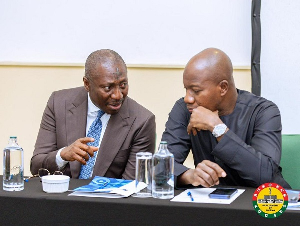K. Owusu-Ampomah
map.owusu@gmail.com
15th February 2013
The 29th African Cup of Nations has come to pass, and it is proper to congratulate Nigeria for lifting the AFCON trophy for the third time in such a graceful manner. South Africa also deserves mentioning for hosting a memorable tournament, which following the trail of the 2010 World Cup has, by now, firmly established her as a favourite destination for elite sporting events.
Whilst Nigeria, indeed, showed a class which is uncharacteristic of this soccer-crazy nation, at least in the past twenty years or so, but reminiscent of the Black Stars of up to 1982, it is fair to say that African soccer has reached a new zenith where individual flair exquisitely blends very well with team work, technical finese and the drive for success. No team showed these characteristics more than Burkina Faso, and they deserve to be congratulated as well for reaching the final of AFCON 2013, which was their first, at the expense of the Mighty Black Stars of Ghana. Who knows what would have happened if they had not appeared to be intimidated by Green Eagles stature and experience in the first half of the game?
Black Stars, even in defeat, are still a force to reckon with in African and world soccer. Currently the team is rated second best in Africa, only next to Cote d’Ivoire, and on the world stage, as we saw at the 2010 World Cup in South Africa, it would take a Suarezian desperation, to keep them at bay even though they are rated 19th.
This time around, however, while their performance clearly still places them amongst the elite football nations in Africa, , it is critical to concede that the country has yet to discover the missing link that has kept her without silverware for 31 years. The journey to unearth this missing link must begin now; not in a knee-jerk fashion, which valorises the blame game, as some people would want to see, but rather in a reflective and intelligent manner that allows a measured but methodical brewing of a rich cocktail of quick fixes and medium- to long-term strategies. On this note I believe the GFA has struck the right chord with its decision to retain the coach, Mr. Kwasi Appiah, contrary to popular demand.
It has been the norm to call for the head of a coach when a team disappoints, and it is unsurprising that several Ghanaians had called for the sacking of Kwasi Appiah. Some even argued that GFA erred by not retaining the Serbian coaches, or bringing on board a foreign coach, which for all intent and purposes meant a white coach. (Heavens would have broken lose, I would bet, if prior to the tournament GFA had hinted of bringing on Stephen Keshi as a coach for Black Stars).
Such arguments that valorize foreign coaches (always implying white coaches) make me wonder why Ghanaians born into freedom tend to think like colonial apologists. Black Stars fail to win AFCON and the reason is that “the coach is black; Kwasi Appiah is not good”. Give me a break. “Why blame Kwasi Appiah?” A contributor (Spiky) has correctly asked in this column, and cogently explained why Kwasi Appiah can’t take the blame for Ghana’s failure to win AFCON 2013. For 30 years i.e. until Kwasi Appiah came to the scene, Black Stars had been coached by white coaches yet the country had not been able to win any big tournament apart from the "flash-in-the-pan" performance at the 2010 World Cup (no disrespect intended for the boys who made us all proud). In our own backyard in 2008 we failed to lift the AFCON cup, coached by a foreigner (white). What did Ghanaians say?
To be sure, as Spiky argues, you cannot compare Kwasi Appiah to the Serbian or European coaches we have ever employed, in terms of exposure, yet he has equalled their achievements in a short space of time that he has been at the helm. That is extremely remarkable; especially given the fact that (I stand to be corrected) he had limited resources at his disposal, had less than a year to prepare the team for the tournament and was not paid as handsomely as the Serbian coaches were paid.
I dare say, in support of Spiky, that it should not be difficult to fathom future outcomes if he is given the resources, paid as the Serbians were paid, and exposed to modern trends in coaching, which I trust GFA is going to do. The dividends will not only be Black Stars winning tournaments but also the domino-effect of his coaching skills on the Ghanaian soccer scene. For this, as speculative as it might be, GFA could not have taken a better decision, which I believe is encapsulated in a much broader and bolder initiative “to empower our own”.
While the GFA is reportedly aware of the hurdles in the cause it has taken, the depth of their commitment is commendable. Hopefully they will hold steadfastly onto their “faith in building local capacity”, which should not stop at Kwasi Appiah, but translated into an entrenched policy in the development of soccer in the country. In the past few decades, African players have developed tremendously, largely as a result of exposure to the game in Europe and elsewhere, where they have had access to some of the finest coaches and sporting facilities in the world. It's time to develop local coaches through a similar route, and in that manner the Ghanaian (African) soccer equation will be balanced, and ready to take on the rest of the world.
Sports Features of Saturday, 16 February 2013
Source: owusu-ampomah, k.












